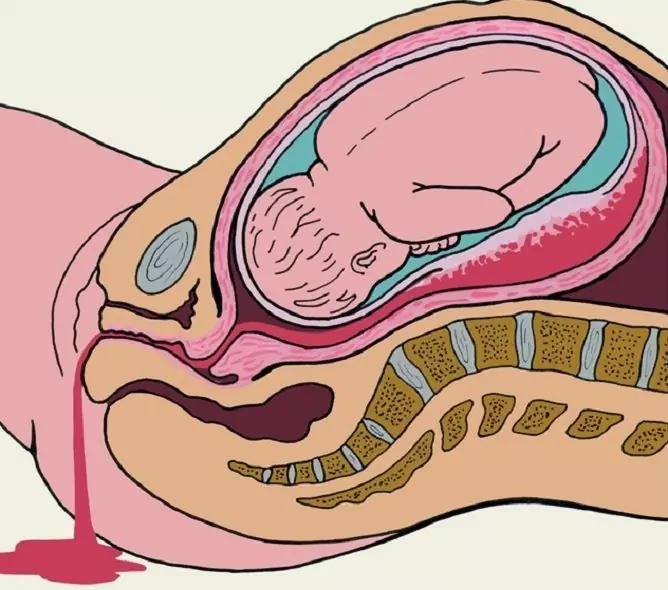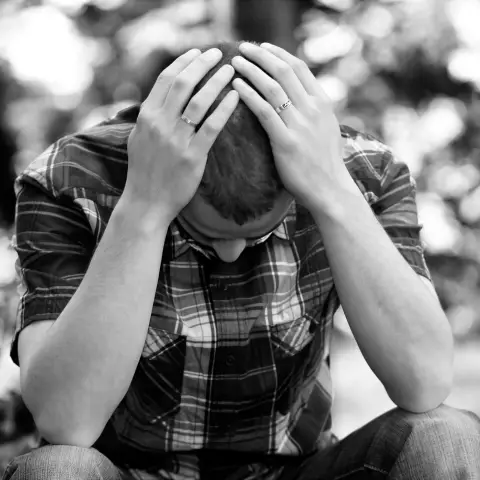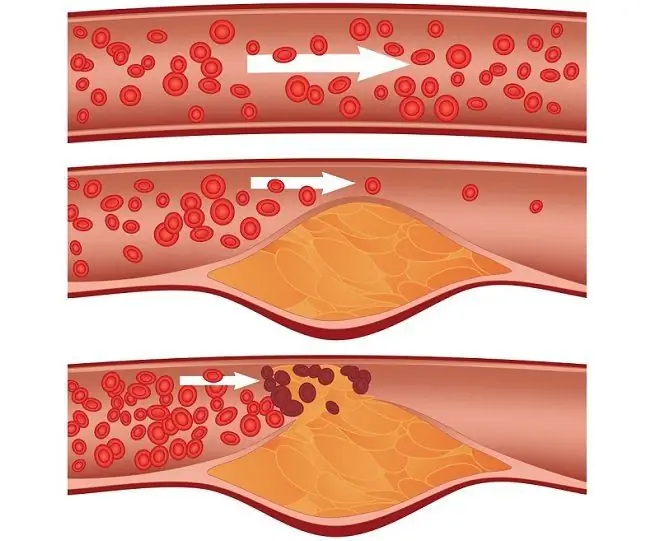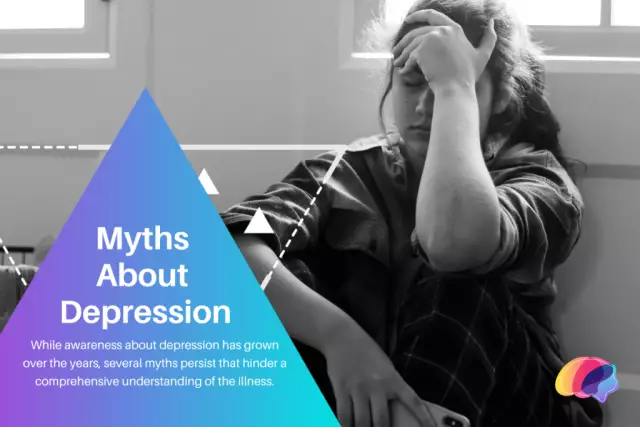- Author Rachel Wainwright wainwright@abchealthonline.com.
- Public 2023-12-15 07:39.
- Last modified 2025-11-02 20:14.
Endogenous depression
The content of the article:
- Endogenous depression causes and risk factors
- Forms of the disease
- Endogenous depression symptoms
- Diagnostics
- Treatment of endogenous depression
- Possible complications and consequences
- Forecast
- Prevention
Depression is a mental illness characterized by depressed and depressed states. Endogenous depression occurs for no apparent reason (not associated with psychogenic or situational exogenous factors), may be a manifestation of an internal disease, has a severe course and a long recovery period, and is prone to recurrence. This condition limits the patient's socialization, and often causes temporary loss of professional and household skills.

Source: womanhi.ru
Depression is one of the most common mental disorders today. Women are more susceptible to it than men. The risk of developing depression increases with age. Thus, among people over 65, depression occurs about 3 times more often in comparison with other age groups. In childhood and adolescence, the prevalence of depression is 15-40%, often depressive disorder in patients of this age group leads to suicide attempts.
Endogenous depression is characterized by the so-called depressive triad of disorders (signs of motor, emotional and ideatorial inhibition) and daily fluctuations in the intensity of clinical signs.
Endogenous depression causes and risk factors
The mechanism of development of the disease is not well understood. It is assumed that the cause of endogenous depression may be a violation of metabolic processes in the brain, namely, a violation of the production of norepinephrine and serotonin.
Norepinephrine, called "wakefulness mediator" - a hormone of the adrenal medulla, belongs to the biogenic amines of the catecholamine group, takes part in the regulation of peripheral vascular resistance and blood pressure, and causes an increase in cardiac output. Serotonin, also called the "hormone of happiness", belongs to the biogenic amines of the tryptamine class and plays the role of a neurotransmitter in the central nervous system. It facilitates motor activity, takes part in the regulation of vascular tone, affects the reproductive system, etc. The synthesis and metabolic processes of norepinephrine and serotonin have a definite connection.
People with certain character traits and personality traits (hyperresponsibility, perfectionism, workaholism, increased sense of duty, suspiciousness, anxiety) have a tendency to develop endogenous depression.
Risk factors include:
- hereditary predisposition;
- chronic somatic diseases;
- metabolic disorders;
- age-related changes;
- physical and mental stress;
- poor nutrition;
- taking a number of medications;
- systematic vigorous activity at night;
- irregular working hours and other professional hazards.
Forms of the disease
Depending on the dominance of a particular trait, the following forms of endogenous depression are distinguished:
- anxious;
- dreary;
- inhibited;
- adynamic;
- anesthetic;
- dysphoric.
Endogenous depression symptoms
Endogenous depression appears unexpectedly. Its signs are: low mood, melancholy, anxiety, low self-esteem, guilt, insecurity, increased self-criticism, hypochondria, and sometimes suicidal thoughts. In contrast to the usual depressed mood, the depressed state is observed for a long time, cannot be corrected by the usual methods (rest, chatting with friends, walking, entertainment). Patients have a reduced range of interests, they become indifferent, shy away from communication, try to minimize social contacts.
The symptoms of endogenous depression also include mental inhibition, which consists in the impossibility of making a quick decision even in an extremely responsible situation, difficulties in analyzing the information received, assessing what is happening, concentrating attention; illogicality and inconsistency of thoughts and actions. Patient movements become slower, and the rate of speech slows down. Asthenia, sleep disorders (insomnia, night and early awakenings) develop, there is a decrease in appetite or excessive appetite, due to which weight is lost or excess is gained. Dyspeptic symptoms may appear - nausea, heartburn, bad breath, constipation. Such violations are reflected in the appearance: pallor of the skin appears, an earthy complexion, the hair becomes dull and brittle. Against the background of lethargy, patients may experience bouts of intense excitement, up to self-injury.
A feeling of tiredness and lethargy does not leave the patient even after a long rest. Also, a decrease in libido, anorgasmia, menstrual irregularities in women, pain in the body of indeterminate localization, compressive pain in the heart and back pain, a feeling of general discomfort are also possible. The depressed psychological state of the patient can induce him to take alcohol and other psychoactive substances.
The patient's mood changes cyclically throughout the day. So, in the case of a mild course of the disease, the peak of suppressed mood falls on the morning hours, and by the evening the condition of the patients improves somewhat. In more severe cases, a melancholy mood and increased unreasoned anxiety are characteristic of the evening hours.
Pathological vital longing is a specific symptom of endogenous depression. At the same time, many patients can localize the sensations of discomfort in a certain part of the body (head, neck, chest) and differentiate this condition from pain and discomfort arising from somatic diseases, as well as from experiences formed under the influence of real reasons.
There may be a feeling of unreality of what is happening (derealization), slowing down of time, depersonalization, a painful feeling of lack of feelings and desires, emotional perception of the surrounding reality. Patients with endogenous depression are characterized by anhedonia, which consists in a decrease or complete loss of the ability to receive pleasure. In severe cases, hallucinations occur that contain fragments of violent actions.
Diagnostics
The diagnosis of endogenous depression is established on the basis of the patient's complaints, anamnesis, as well as an assessment of the level of depression using special tests (Zang's scale for self-assessment of anxiety, Beck's depression scale, a test for determining the level of depression, adapted by T. I. Balashova, etc.).
An important indicator for the diagnosis of endogenous depression is the expressed mental retardation of the patient (slowing down of the rate of speech, speed of thinking, patients need more time than usual to express their thoughts and formulate answers to the questions posed). A slowdown in the tempo of speech is noted throughout the dialogue with the patient, which distinguishes endogenous depression from asthenic conditions.
If endogenous depression is suspected, a laboratory examination is carried out, including the determination of the level of hormones in the blood, the hemoglobin content, etc. In case of signs of somatic pathology, the patient is referred for consultation to specialists (endocrinologist, gastroenterologist, etc.).
Endogenous depression must be differentiated from psychogenic depressive disorder, which is characterized by an association with overt or latent psychological trauma.
Treatment of endogenous depression
Endogenous depression is usually treated on an outpatient basis. In severe cases, hospitalization may be indicated. It is necessary to eliminate possible factors stimulating the development of pathology, for which a correction of the patient's lifestyle is required, including the normalization of work and rest, nutrition, etc.
The main treatment for endogenous depression is the use of antidepressants, which should be continued for some time after the symptoms of the disease have completely disappeared, since with premature termination of therapy there is a risk of deterioration of the patient's condition and relapse. In addition, abrupt cessation of antidepressant medications can lead to withdrawal symptoms. As a rule, motor and mental retardation decreases after 2-3 weeks of drug treatment, but depressed mood and suicidal thoughts may persist for a little longer.
In addition to antidepressants, normotimics can be used to help stabilize mood and prevent the development of new episodes of depression.
Psychotherapy in the treatment of endogenous depression plays an auxiliary role, serving as an adjunct to drug therapy. The most common psychotherapy methods for depressive disorders are:
- existential - aimed at realizing one's life values;
- cognitive-behavioral - aimed at increasing activity, acquiring social competence, training self-control, reducing the severity of the patient's negative ideas about himself and the world around him, eliminating residual symptoms after successful drug therapy;
- interpersonal - teaching social skills that caused difficulties in the patient;
- psychodynamic - based on the theory of psychoanalysis;
- client-centered; etc.

Source: ufavesti.ru
A set of physical exercises is prescribed due to the effect of physical activity on the neurotransmission of certain mediators (an increase in the production of serotonin, β-endorphins), an increase in body temperature and, accordingly, metabolic rate, an increase in the body's tone. Patients are advised to practice yoga, take vitamin and mineral complexes, and take long walks in the fresh air.
Ancillary treatments for endogenous depression include phototherapy, sleep deprivation, low frequency alternating magnetic field therapy, vagus nerve stimulation, massage, art therapy, occupational therapy, aromatherapy.
Possible complications and consequences
A consequence of endogenous depression can be a suicide attempt.
Against the background of drug therapy, tachycardia, arterial hypertension, confusion, dysuria, allergic stomatitis, hyperglycemia, weight gain, erectile dysfunction, and visual disturbances can develop.
Forecast
Adequate treatment taken in time can get rid of the symptoms of endogenous depression, or at least reduce their severity and prevent the development of complications. With the traumatic effects of external factors and in the absence of correctly selected therapy, the prognosis worsens.
Prevention
In order to prevent the development of endogenous depression, it is recommended:
- avoidance of excessive mental and mental stress;
- avoidance of vigorous activity at night, especially if there is a tendency to develop endogenous depression;
- measured mode of work and rest;
- full night rest;
- balanced diet;
- rejection of bad habits;
- sufficient physical activity;
- avoidance of occupational hazards.
To prevent relapse of depression, patients may be advised to take small doses of antidepressants under the supervision of a physician.
YouTube video related to the article:

Anna Aksenova Medical journalist About the author
Education: 2004-2007 "First Kiev Medical College" specialty "Laboratory Diagnostics".
The information is generalized and provided for informational purposes only. At the first sign of illness, see your doctor. Self-medication is hazardous to health!






